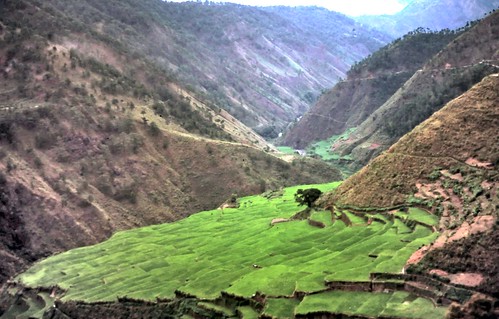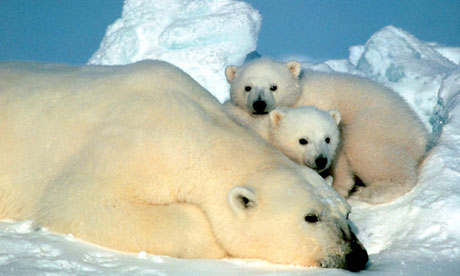Search Results for Tag: emissions
Now Boarding
 Whether it's to escape cold weather, visit family or friends or explore a new place, a lot of you out there probably have a trip or planned this winter. And chances are that most of you will be flying to get to your destination. Millions of people are in the air everyday, and unfortunately that has serious consequences for our environment.
Whether it's to escape cold weather, visit family or friends or explore a new place, a lot of you out there probably have a trip or planned this winter. And chances are that most of you will be flying to get to your destination. Millions of people are in the air everyday, and unfortunately that has serious consequences for our environment.
Back in 2008, the UN Intergovernmental Panel on Climate Change put out some alarming statistics on flying: every year, planes burn around 130 million tons of fuel. If you think that's bad, that number is supposed to climb to 450 million tons by the year 2050. Of course, many airlines out there are working to make their planes more green-friendly by doing things like eliminating pollutants from jet exhaust and developing bio-fuel technology.
But what can you do? Flying is unavoidable sometimes–taking a bus or a train just isn't an option for some trips. But you can be more aware of the impact your flights have on the environment. Here at Global Ideas, we have a useful emissions calculator that gives you an idea how much each flight you take is contributing to global warming. In fact, we use this calculator to offset our own trips!
Rice – staple crop and climate killer?
Our reporter Carl Gierstorfer is currently filming in the Philippines for his upcoming report on sustainable rice production: Here is his third dispatch from the field:
 "There are a lot of challenges ahead to adapt the world's most important crop – rice – to the consequences of climate change. Fortunately scientists got some smart ideas. But you might be surprised that rice farming itself has a negative impact on the world's climate. Not the plant is the problem, but the method in which it is grown. Rice (a sort of grass) needs a lot of water to grow. In fact, farmers flood their fields during the farming season, so that a fair part of the plant is submerged. This has many advantages; it keeps pests at bay, recycles nutrients and so on. But there is a downside. In these oxygen-depleted conditions bacteria grow that emit methane, a powerful greenhouse gas. In rice producing countries, the total emissions of methane make up a significant part of greenhouse gas emissions.
"There are a lot of challenges ahead to adapt the world's most important crop – rice – to the consequences of climate change. Fortunately scientists got some smart ideas. But you might be surprised that rice farming itself has a negative impact on the world's climate. Not the plant is the problem, but the method in which it is grown. Rice (a sort of grass) needs a lot of water to grow. In fact, farmers flood their fields during the farming season, so that a fair part of the plant is submerged. This has many advantages; it keeps pests at bay, recycles nutrients and so on. But there is a downside. In these oxygen-depleted conditions bacteria grow that emit methane, a powerful greenhouse gas. In rice producing countries, the total emissions of methane make up a significant part of greenhouse gas emissions.
Now here is the challenge: feed ever more people with rice, make farming more productive, but reduce emissions of greenhouse gases. Impossible? There is a way to get rid of the gas-emitting bacteria and even save precious water along the way. It is a simple method that scientists now try to bring to the farmers. How exactly this works, you will find out in my report.
We have traveled a fair deal now: from Manila south to the International Rice Research Institute (IRRI), then up north to the granary of the Philippines – the region of Nueva Ecija. We then headed to northern Luzon, to the Sierra Madre mountain range. Here are the famous rice terraces, carved into the hillsides by farmers some 2000 years ago. A UNESCO world heritage site – and topic of my next entry…"
(image thanks to CanadaGood @flickr)
Good news for polar bears?
 Well, yes, if a new study is to be believed… Researchers claim that the Earth's polar ice caps are not likely to melt as rapidly or irreversibly as previously thought. The polar bear can be saved from extinction – but only if action is taken quickly. Greenhouse gas emissions must be cut tremendously. The study was published in the journal Nature. Find our more about it here.
Well, yes, if a new study is to be believed… Researchers claim that the Earth's polar ice caps are not likely to melt as rapidly or irreversibly as previously thought. The polar bear can be saved from extinction – but only if action is taken quickly. Greenhouse gas emissions must be cut tremendously. The study was published in the journal Nature. Find our more about it here.Ready! Set! Go! Win a GLOBAL IDEAS USB flash drive!

You have played our new WebDocumentary about Guyana?
Well, then it's up to you to show us what you have learned!
Go to our website…
@ http://bit.ly/guyana_quiz_01
…and answer the first of five questions.
Until friday we will ask you one question a day. Answering each question gives you five letters. Put them in the right order and you will get a solution word. Send us the word on friday and you will have pretty high chance to win one of the flash drives.
If you have not played the WebDocumentary yet, here's your chance (again): http://bit.ly/WebDoc_Guyana
The whole GLOBAL IDEAS team wishes you the best of luck. And don't forget, there will be ten winners. Take your chance!
(ke)
It’s not all about 2 degrees
On the margins of the Cancun climate conference we have talked to Andreas Kohn who consults companies on the issue of emissions trading. He attends the conference to stay up to date on the regulatory and financial issues the COP16 negotiations may entail. The green strategy consultant told GLOBAL IDEAS why a fixation with numbers isn't always the best thing when it comes to saving our climate. Focusing solely on keeping the rise of global temperatures below 2 degrees this century is misleading – if we forget what this actually means in terms of dangerous climate change, he said.








Feedback